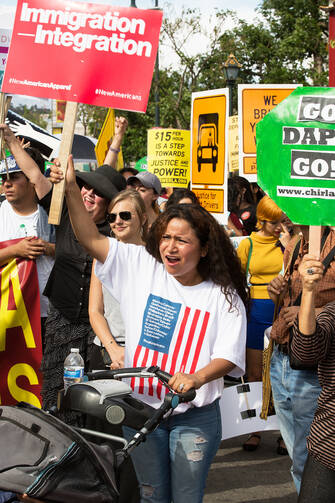On Tuesday the city council of Los Angeles voted 14-1 to almost double the minimum wage in the city, from $9 to $15, over the next five years. It’s a decision that will have huge effects on the city, where almost 50 percent of the city’s work force earns less than that amount. Over 800,00 Angelinos could see their salaries go up.
In fighting for the raise, groups like the Economic Roundtable have noted that Los Angeles both has a higher cost of living that Chicago, Dallas, Philadelphia or Seattle; and its median earnings—the midpoint of all salaries—is also far less than those cities.
The Roundtable also notes that 80 percent of low-wage jobs are face to face. The point being, their jobs are not easily cut. (One of the main arguments of the small business community has been that raising the minimum wage means they will have to fire workers.)
The LA Chamber of Commerce, which opposed the bill, thinks many small businesses will be forced to move outside the city limits or close down completely. Said Ruben Gonzales of the Organization to the LA Times, "It's simple math," Gonzalez said. "There is simply not enough room, enough margin in these businesses to absorb a 50-plus percent increase in labor costs over a short period of time."
It's an interesting dilemma—if businesses do close or move, nobody wins. And at the same time, the idea that any business should be allowed to pay less than a living wage is not right, either.
And it's not as though minimum wage earners are now set. Someone working full time at the new minimum would earn $600/week, $30,000 a year before taxes. That’s about $6,600 above the federal poverty level—but again, Los Angeles has a higher cost of living than almost anywhere in the country.
Also, according to a 2014 Pew Research Center study 64 percent of Americans who make the minimum wage receive only part time work to begin with.
Still, there is a way of making this work without small businesses closing or moving or firing employees. Namely, we who live in Los Angeles could agree to pay more for those services.
No business owner in his right mind wants to suggest that, because hey, there's always another Italian restaurant. Every day as consumers, we put value for us far above most things, including the cost of the labor that went into it. Society encourages that way of thinking; it even hides the losers of that game, placing out of view the people who cook our meals, clean our dishes or make these cool products we want, allowing us to isolate our decisions from any sense of consequence.
Where I choose to shop or eat, that doesn't affect anyone. We live, quite happily, in a vacuum. (Which by the way is a fantastic position from which to judge the responsibilities of others. It's the Maui of moral superiority.)
It's great that so many Angelinos are cheering this massive minimum wage increase. It definitely has the potential to help a lot of people. But if we really want that to happen, it's not going to be just because small business owners agree to suck it up. It's not like their profit margins are massive to begin with.
No, at some point we're almost certainly going to have to agree to pay more.
The possibility of that conversion of heart remains to be seen.








